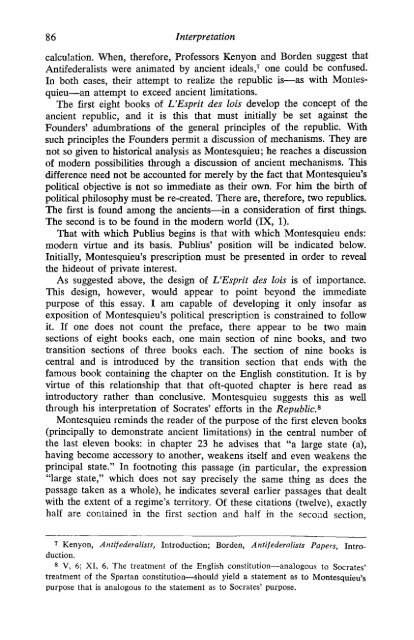philosophy - Interpretation
philosophy - Interpretation
philosophy - Interpretation
You also want an ePaper? Increase the reach of your titles
YUMPU automatically turns print PDFs into web optimized ePapers that Google loves.
state."<br />
state,"<br />
86 <strong>Interpretation</strong><br />
calculation. When, therefore, Professors Kenyon and Borden suggest that<br />
Antifederalists were animated by<br />
ancient ideals,7 one could be confused.<br />
In both cases, their attempt to realize the republic is<br />
quieu<br />
an attempt to exceed ancient limitations.<br />
The first eight books of L'Esprit des lois develop<br />
as with Montes<br />
the concept of the<br />
ancient republic, and it is this that must initiaUy be set against the<br />
Founders'<br />
adumbrations of the general principles of the republic. With<br />
such principles the Founders permit a discussion of mechanisms.<br />
They are<br />
not so given to historical analysis as Montesquieu; he reaches a discussion<br />
of modern possibilities through a discussion of ancient mechanisms. This<br />
difference need not be accounted for merely by the fact that Montesquieu's<br />
pohtical objective is not so immediate as their own. For him the birth of<br />
pohtical <strong>philosophy</strong> must be re-created. There are, therefore, two republics.<br />
The first is found among the ancients in a consideration of first things.<br />
The second is to be found in the modern world (IX, 1).<br />
That with which Publius begins is that with which Montesquieu ends:<br />
modern virtue and its basis.<br />
Publius'<br />
position wUl be indicated below.<br />
Initially, Montesquieu's prescription must be presented in order to reveal<br />
the hideout of private interest.<br />
As suggested above, the design of L'Esprit des lois is of importance.<br />
This design, however, would appear to point beyond the immediate<br />
purpose of this essay. I am capable of<br />
developing it only<br />
insofar as<br />
exposition of Montesquieu's political prescription is constrained to foUow<br />
it. If one does not count the preface, there appear to be two main<br />
sections of eight books each, one main section of nine books, and two<br />
transition sections of three books each. The section of nine books is<br />
central and is introduced by the transition section that ends with the<br />
famous book containing the chapter on the English constitution. It is by<br />
virtue of this relationship<br />
introductory<br />
that that oft-quoted chapter is here read as<br />
rather than conclusive. Montesquieu suggests this as weU<br />
through his interpretation of Socrates' efforts in the Republic. 8<br />
Montesquieu reminds the reader of the purpose of the first eleven books<br />
(principaUy to demonstrate ancient limitations) in the central number of<br />
the last eleven books: in chapter 23 he advises that "a large state (a),<br />
having become accessory to another, weakens itself and even weakens the<br />
principal<br />
In footnoting this passage (in particular, the expression<br />
"large which does not say precisely the same thing as does the<br />
passage taken as a whole), he indicates several earlier passages that dealt<br />
with the extent of a regime's territory. Of these citations<br />
(twelve), exactly<br />
half are contained in the first section and half in the second section,<br />
7 Kenyon, Antifederalists, Introduction; Borden, Antifederalists Papers, Intro<br />
duction.<br />
8 V, 6; XI, 6. The treatment of the English constitution analogous to Socrates'<br />
treatment of the Spartan constitution<br />
should yield a statement as to Montesquieu's<br />
purpose that is analogous to the statement as to Socrates' purpose.
















